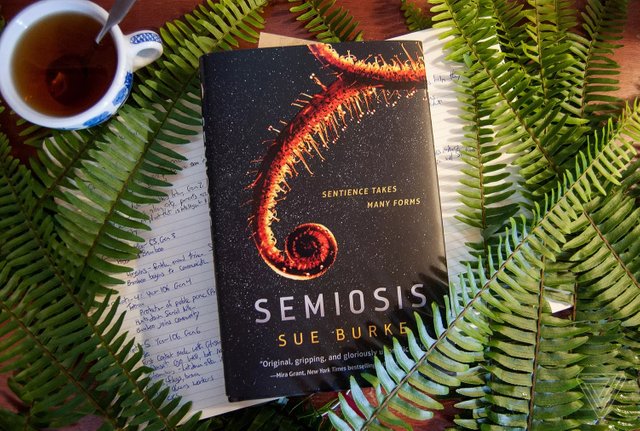Figuring out how to get by, as well as to flourish with an outsider world

All through its history, sci-fi has envisioned how humankind may meet its inestimable neighbors. How might the principal contact with outsiders go? Creators have envisioned an assortment of situations, from the want for friendly association between humanoid species, to genocidal threatening vibe between lifeforms that we scarcely perceive. In Sue Burke's introduction novel Semiosis, she envisions contact exceptionally: first contact not with creature like life, but rather amongst people and a planet loaded with shrewd plants.
A few spoilers ahead for the novel.
At the point when Semiosis opens, a human provincial campaign — which left Earth in the 2060s — is set out toward a far off star. Aggravated by natural debasement and war on Earth, their main goal was to hit the reset catch for humankind on a virgin world. Subsequent to going for a long time through space, they go to a star called HIP30815f, around which circles a tenable world, which they name Pax to connote their quiet goals. It's somewhat bigger than Earth, and there's bounteous vegetation at first glance. It's just about an ideal place for another human progress.
Be that as it may, there are a few knocks en route. The homesteaders' cases crash in the planet's heavier gravity, bringing about the passings of a few people and the demolition of essential gear. They're entering an inconceivably unique biome, which has its own entanglements: various pioneers contract sicknesses or bite the dust from wounds, and a little while later, they understand that a portion of the plant species are wise.
Terrestrial plants aren't simply aloof life forms: trees can discuss threat with each other to repulse attacking creepy crawlies, discharge chemicals that can turn bugs against each other, and trade RNA. In an article, Burke takes note of that plants exist in a nonstop condition of war against their neighbors, vieing for daylight, and adjusting with the goal that creatures and people will spread their seeds over the planet. She's interpreted this condition of fighting to Pax, where humankind experiences a biological system of astute life, and needs to not just figure out how to get by in an outsider domain, yet exist together nearby their new neighbors.
Burke begins her book with the main gathering of human settlers, and in the accompanying sections, hops between progressive ages of people traversing over a century in time. The second part takes after Sylvia, an individual from the original of people conceived on Pax, who finds an outsider city made of glass and a bamboo-like plant that is by all accounts uncontrollably savvy, as well as is drawing individuals into the city. We meet this bamboo in a later section, as it looks to tame the newcomers keeping in mind the end goal to extend and develop with their assistance. The human homesteaders later meet the Glassmakers, a prior types of outsider pioneers who fabricated the city, however later deserted it.
Semiosis is reminiscent of first-contact stories like Allen M. Steele's Coyote and Kim Stanley Robinson's Aurora, putting an accentuation on the difficulties of people living some place other than Earth. Burke's pioneers battle with antagonistic plant and creature life that could rub them off the planet's surface, and their endeavors to just get by with small assets. In any case, Burke includes another complexity: her characters fled a destroyed Earth, and work to make due, as well as modify human advancement in a way that strengthens collaboration and solidarity. They're helped by Stevland, the shrewd bamboo that they met in the glass city, which first tries to utilize them as instruments for its own particular wellbeing and development, however which later goes along with them as an individual from their general public, cross-pollinating their qualities.
At the point when the underlying experiences with the Glassmakers don't go as arranged, the inhabitants of the province battle with the reaction: battle them, or endeavor to connect their disparities and incorporate them into their general public. The characters come to comprehend that the Glassmakers' social structure has separated, and they're driven by more youthful, more vicious individuals who undermine to pulverize the whole province. The experience powers Stevland and whatever is left of the human pioneers to come to scrutinize the qualities that educate their growing progress so as to safeguard who they need to be, or fall back to the more seasoned ways that they deserted when they fled Earth.
More libertarian strains of sci-fi may have contended that humankind has an obligation to stay free of outside impacts and hence dismiss the social and substance designing that the plants can use on individuals. In any case, Burke takes the story toward another path, flaunting the beginnings of a progress that is based on common trust and seeing, as opposed to a more go only it one. Burke's juxtaposition of the two social orders flaunts two things: that gatherings have a tendency to take after solid pioneers, even to their weakness, and that aggregate working for a shared objective can flourish against affliction.
Burke doesn't answer every one of the inquiries that she raises: when we meet the Glassmakers, they deserted their city and scratched out a cruel, migrant presence. While there are insights that they may have rejected the taming that Stevland looked for, it's never completely replied, even as that inquiry would have made a profitable expansion to the contention that the people appear to think about. In addition, while the book keeps running for a little more than a century, we just observe the beginnings of a shaky presence for mankind. Ideally, Burke will come back with another book to monitor the improvement of this entrancing world.
Source:
https://quantamagazine.org/the-secret-language-of-plants-20131216/
https://theverge.com/2017/7/11/15948422/tomato-plant-chemicals-caterpillar-cannibalism
https://www.whatever.scalzi.com/2018/02/08/the-big-idea-sue-burke/

tres bien bon poste continues
Downvoting a post can decrease pending rewards and make it less visible. Common reasons:
Submit